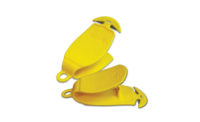Multi-purpose gloves meet multi-tasking needs

Look at the modern workplace, where the gap between employment and productivity has been growing dramatically since the turn of the century.1 Advances in computing, robotics and other automated systems have contributed to a shrinking workforce in traditional manufacturing and industrial environments while creating opportunities in other areas. This evolution is changing not only the workplace, but the responsibilities and safety needs of today’s workers.
For example, the U.S. and China are the world’s largest manufacturers, but there are fewer manufacturing jobs in those two countries today than there were in 1997.2 While some of that is a result of the economic recession, it also is indicative of increased automation in many factories and manufacturing plants. What we’re seeing as a result is a demand for more versatile, tech-savvy workers in those environments, and when the role of workers changes, so do their needs for personal protective equipment.
Versatility is key
More and more of today’s workers must multi-task, and it’s true across verticals. Their days are spent roaming the plant, performing different jobs, with less time anchored to a single workstation. That may mean sorting parts along a line, entering or accessing data on a computer or through paperwork, or loading or unloading heavy items as needed. Each of those tasks involves different requirements for the hands. Rather than changing gloves at every stop — or worse yet, eschewing hand protection — today’s multipurpose gloves provide an option that can be used throughout the facility.
| To learn more about hand protection, CLICK HERE |
This hasn’t always been the case, but technology isn’t just changing the workplace; it’s changing hand protection as well. Today’s gloves deliver the comfort, dexterity, breathability and ergonomics needed for workers who wear them all day, durability that delivers value, and most importantly, injury prevention that improves worker safety in multiple venues.
Versatile protection that doesn’t compromise comfort and performance is critical in these diverse environments where, all too often, workers have chosen to forego gloves altogether. The risks range from the seemingly minor (cuts and scrapes) to the severe (injuries related to poor grip and dropping, such as broken bones). Educating workers who have never worn gloves about the importance of hand protection can be difficult, but is critical. Providing a glove that allows workers to seamlessly transition between tasks throughout the work day encourages safety compliance.
The tech takeover
The same worker who has to sort through nuts and bolts or lift and load a shipment of auto parts often is responsible for tracking those parts via computers and touch screens. A recent Ansell survey indicated 65 percent of U.S. companies started using touch screens within the last three years and 90 percent of business decision-makers expect to increase employee use of touch screens over the next five years. Whether it’s phones, tablets or equipment with touch-screen interfaces, their use in the workplace is only going to increase.
With that in mind, taking the gloves off every time a worker needs to use a touch screen is impractical and inefficient. Many of today’s multipurpose gloves are designed for use with touch screens, eliminating another barrier to widespread use.
And the impact of an increased digital presence in our lives and workplace isn’t limited to the time spent holding that smart phone or tablet. Consider this: In 2000, there were approximately 140 million PCs shipped worldwide3, and by the end of the next decade, that number was 350 million.4 By 2011, smart phones had eclipsed PCs with 360 million units sold — and that was a market that didn’t even exist 10 years ago. Projections suggest smart phones will outsell PCs by 1 billion units by 2016 — and that’s not even factoring in tablets, which are expected to reach 500 million in sales by 2015.5
What does it all mean for gloves in the workplace? It means more and more jobs involving sophisticated, smaller electronics, and those jobs have their own, specific requirements for gloves — precise fit, extreme dexterity and tactility at the top of the list. And quality multipurpose gloves can deliver on all counts.
The bottom line
Best-in-class multipurpose gloves deliver a versatile solution. Factor in superior durability and longevity, and the ROI becomes clear. Of course, the true differentiator is performance, where injury prevention is the top priority.
Sources
1 http://www.technologyreview.com/sites/default/files/images/destroying.jobs_.chart1x910_0.jpg
2 http://www.technologyreview.com/featuredstory/515926/how-technology-is-destroying-jobs/
3 http://news.cnet.com/HP-back-on-top-of-PC-market/2100-1003_3-5141213.html
4 http://www.gmanetwork.com/news/story/210464/scitech/global-pc-shipments-grew-13-8-percent-in-2010-gartner-study
5 http://www.businessinsider.com/the-future-of-mobile-deck-2012-3?op=1
Looking for a reprint of this article?
From high-res PDFs to custom plaques, order your copy today!




